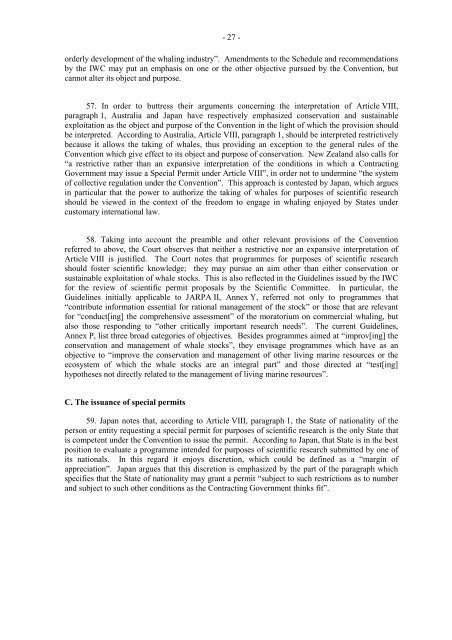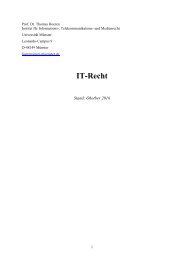3d4yVkKMl
3d4yVkKMl
3d4yVkKMl
You also want an ePaper? Increase the reach of your titles
YUMPU automatically turns print PDFs into web optimized ePapers that Google loves.
- 27 -<br />
orderly development of the whaling industry”. Amendments to the Schedule and recommendations<br />
by the IWC may put an emphasis on one or the other objective pursued by the Convention, but<br />
cannot alter its object and purpose.<br />
57. In order to buttress their arguments concerning the interpretation of Article VIII,<br />
paragraph 1, Australia and Japan have respectively emphasized conservation and sustainable<br />
exploitation as the object and purpose of the Convention in the light of which the provision should<br />
be interpreted. According to Australia, Article VIII, paragraph 1, should be interpreted restrictively<br />
because it allows the taking of whales, thus providing an exception to the general rules of the<br />
Convention which give effect to its object and purpose of conservation. New Zealand also calls for<br />
“a restrictive rather than an expansive interpretation of the conditions in which a Contracting<br />
Government may issue a Special Permit under Article VIII”, in order not to undermine “the system<br />
of collective regulation under the Convention”. This approach is contested by Japan, which argues<br />
in particular that the power to authorize the taking of whales for purposes of scientific research<br />
should be viewed in the context of the freedom to engage in whaling enjoyed by States under<br />
customary international law.<br />
58. Taking into account the preamble and other relevant provisions of the Convention<br />
referred to above, the Court observes that neither a restrictive nor an expansive interpretation of<br />
Article VIII is justified. The Court notes that programmes for purposes of scientific research<br />
should foster scientific knowledge; they may pursue an aim other than either conservation or<br />
sustainable exploitation of whale stocks. This is also reflected in the Guidelines issued by the IWC<br />
for the review of scientific permit proposals by the Scientific Committee. In particular, the<br />
Guidelines initially applicable to JARPA II, Annex Y, referred not only to programmes that<br />
“contribute information essential for rational management of the stock” or those that are relevant<br />
for “conduct[ing] the comprehensive assessment” of the moratorium on commercial whaling, but<br />
also those responding to “other critically important research needs”. The current Guidelines,<br />
Annex P, list three broad categories of objectives. Besides programmes aimed at “improv[ing] the<br />
conservation and management of whale stocks”, they envisage programmes which have as an<br />
objective to “improve the conservation and management of other living marine resources or the<br />
ecosystem of which the whale stocks are an integral part” and those directed at “test[ing]<br />
hypotheses not directly related to the management of living marine resources”.<br />
C. The issuance of special permits<br />
59. Japan notes that, according to Article VIII, paragraph 1, the State of nationality of the<br />
person or entity requesting a special permit for purposes of scientific research is the only State that<br />
is competent under the Convention to issue the permit. According to Japan, that State is in the best<br />
position to evaluate a programme intended for purposes of scientific research submitted by one of<br />
its nationals. In this regard it enjoys discretion, which could be defined as a “margin of<br />
appreciation”. Japan argues that this discretion is emphasized by the part of the paragraph which<br />
specifies that the State of nationality may grant a permit “subject to such restrictions as to number<br />
and subject to such other conditions as the Contracting Government thinks fit”.



